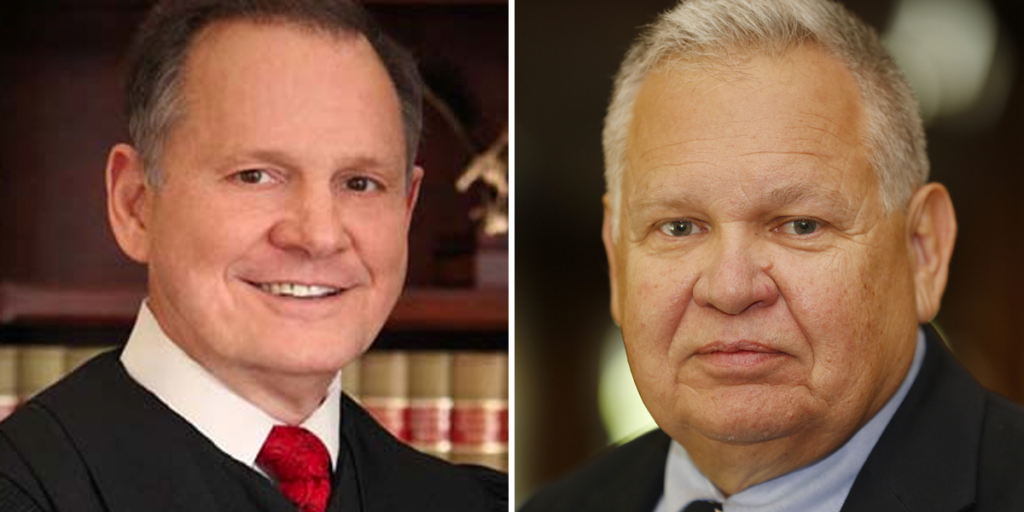Alabama-Florida State kicks off this season’s games to watch

College football’s four-team playoff has altered some of the drama of the regular season. On one hand, some of the biggest games aren’t necessarily must-wins, since one loss may not end a team’s playoff hopes. Clemson lost in November last year and still went on to win the national title. Ohio State made the playoff despite failing to win its conference. The tradeoff, of course, is that more teams are in the hunt later in the season — and that can mean more compelling games in more leagues. If a game has conference title implications in a top league, it can also have playoff implications. That makes it hard to single out just six games to watch over the next three months, but here are a few matchups to circle during the regular season: ___ Alabama vs. Florida State (Sept. 2) The top-ranked Crimson Tide and third-ranked Seminoles face off in Atlanta in just the fourth season-opening game involving teams in the top five. No, the loser won’t be out of the playoff race, but its margin for error will be a bit lower. And games like this between two national title contenders are what fans crave for nonconference play. Alabama also started last season with a neutral-site game against a big-name program. The Tide beat Southern California 52-6. ___ Clemson at Louisville (Sept. 16) Deshaun Watson and Lamar Jackson put on quite a show in this matchup last season, combining for 601 yards passing and 253 rushing. A couple of late touchdown passes by Watson lifted Clemson to a 42-36 win. Now the Tigers must replace Watson, while Jackson, last year’s Heisman Trophy winner, returns to lead the Cardinals. ___ Penn State at Ohio State (Oct. 28) The Nittany Lions upset the Buckeyes 24-21 last year thanks to a blocked field goal return in the fourth quarter. That was enough to keep Ohio State out of the Big Ten title game, but although Penn State won the conference, it was the Buckeyes who went to the playoff. Both teams will have plenty of motivation for this one. ___ Oklahoma at Oklahoma State (Nov. 4) In each of the past two seasons, Oklahoma won this matchup in the regular-season finale with the Big 12 title on the line. The Sooners and Cowboys will play earlier this year, and the Big 12 is bringing back its conference title game — but that won’t take too much of the luster off Bedlam. Quarterback Baker Mayfield is back for Oklahoma, but coach Bob Stoops isn’t, and that might give Oklahoma State an opening this time. ___ Washington at Stanford (Nov. 10) Washington’s 44-6 win over the Cardinal last September made it clear that Chris Petersen‘s Huskies were for real. They ended up winning the Pac-12 title and advancing to play Alabama in the national semifinals. Stanford has to replace record-setting running back Christian McCaffrey but will have home-field advantage against Washington on a Friday night in November. If the Huskies can get past Colorado on Sept. 23, they could enter the Stanford game unbeaten. ___ Ohio State at Michigan (Nov. 25) The Buckeyes prevailed in a double-overtime thriller last year for their 12th victory in the past 13 meetings against their biggest rivals. Jim Harbaugh has only one returning starter on defense, but the Wolverines get Ohio State at home this year. Republished with permission from the Associated Press.
Jim Zeigler throws support behind Roy Moore for US Senate

State Auditor Jim Zeigler on Friday announced his endorsement of former Chief Justice Roy Moore for U.S. Senate in the Sept. 26 runoff election. Moore takes on appointed-incumbent Sen. Luther Strange in next month’s runoff following an Aug. 15 primary in which neither candidate earned the necessary 50 plus one percent of the vote to outright secure the Republican Party’s nomination. “The contrast is clear between Bentley-appointed senator Strange and future senator Roy Moore,” Zeigler said in a news release. “Strange is in lock-step with the Washington Insiders who own his campaign funding. Roy Moore will be committed to Alabama citizens, the Constitution, and the values on which America was founded.” Zeigler’s endorsement comes as little surprise as he’s long spoken out against Strange and his February appointment to the U.S. Senate by former Gov. Robert Bentley. He’s taken to social media to release information against Strange on a near daily bases. “Luther Strange obstructed the impeachment process of then-governor Robert Bentley,” Zeigler added. “The people of Alabama have the final say in this senate seat. I believe the voters will rise up and reject Bentley-appointed Senator Strange in favor of a people’s-elected Senator Roy Moore.” Moore led the crowded Aug. 15 primary with 39 percent of the vote, vs. Strange’s 32 percent. The winner of the runoff will go on to face Democratic nominee Doug Jones in the Dec. 12 general election.
Kay Ivey says all daycare centers should be licensed after death of 5yr old

Following the tragic death of 5-year-old Kamden Johnson at an unlicensed daycare in Mobile, Ala., Governor Kay Ivey said state laws need to change and that she believes all daycare centers operating in Alabama should be licensed through the state. “I strongly favor that if you’re going to be a daycare center for children you need to be licensed by the state,“ Ivey told reporters while attending the Association of County Commissions of Alabama Convention in Orange Beach. Alabama is only one of seven states that still allows daycare centers to operate without regulation if they are a part of a church or ministry. Under current law, child care centers may claim religious exemption status and avoid background checks for workers and facility inspections. Many purport Johnson’s death could have been avoided had the facility been licensed and the workers better vetted. This isn’t the first time this year the notion of licensing daycares has come up in the Yellowhammer State. In April, the state Legislature considered HB277, the Child Care Safety Act, which would have required more oversight for faith-based daycares. While the bill overwhelmingly passed the House of Representatives, it ultimately died in the Senate. “Any child that’s in the care of a daycare center, that center needs to be licensed to ensure that we’ve got quality folks rendering quality service to protect our children,” added Ivey. Alabama Attorney General Steve Marshall agrees with Ivey — something needs to change. ” I think as a state we should have an interest to make sure that children are safe,” Marshall told WPMI Local 15 news. “We need to be able to establish a regulatory framework whatever that may be to make sure that that happens.”
Filming for new John Travolta, Shania Twain movie continues in Alabama

Country music star Shania Twain and famed “Grease” and “Saturday Night Fever” actor John Travolta’s new racing movie “Trading Paint” will film in Hoover, Ala. on Friday the Hoover Sun is reporting. Nick Manakides, owner of the Golden Rule Bar-B-Q at 1571 Montgomery Highway, told the Hoover Sun the film crew for the movie is supposed to arrive at his restaurant at about 7:30 or 8 a.m., followed by extras at 9:30 a.m. and actors at 10 a.m. The Hoover shoot is at least the second Alabama location in which production has filmed since principal photography launched in the state last week. Shooting is scheduled to continue through mid-September at several Alabama locations, particularly the Bessemer/Hueytown area outside of Birmingham. The film tells the story of a veteran race car driver (Travolta) and his son (Tony Sebastian), a fellow driver as they overcome family and professional conflicts, and try to balance competition, ego, resentment and a racing nemesis in order to come out stronger on the other side. The movie is scheduled for a June 2018 release, according to IMDB.
Change.org petition calls for removal of State BOE member Ella Bell

Vice-President of the Alabama Board of Education Ella Bell has found herself under fire following a June 21 board meeting in which she asked whether or not a special academy could be formed for special needs students in order to improve test scores within Alabama’s public schools. “Is it against the law for us to establish perhaps an academy on special education or something on that order,” asked Bell, “so that our scores that already are not that good would not be further cut down by special-ed’s test scores involved?” While her question didn’t draw ire on the spot, it caught the attention of Cameron Smith, a regular columnist for AL.com and vice president for the R Street Institute, a think tank in Washington, D.C. who wrote a column on Thursday saying Bell wants to “force special needs children into an institution.” Now there’s a change.org petition calling for her to immediately be removed from the board of education. Less than 18 hours after it’s creation, the petition started by Mary Catherine Hanson of Bessemer, Ala. has over 30,000 signatures. Bell claims her remarks were taken out of context. “The AL.com article with the headline stating a desire to ‘institutionalize’ special-need students takes my remarks out of context and defies the standards of objective journalism,” Bell released in a statement via the BOE on Thursday. “I never uttered the word nor have I ever considered ‘institutionalizing’ students with special needs. I asked a question about the legality of creating an academy that focuses squarely on the needs of students with intellectual disabilities. I understand how insensitive what I said must have sounded. To individuals who were offended by my remarks, no matter how well intended they were, I sincerely apologize. Watch Bell’s question at the board meeting below: https://youtu.be/q2nHaxJtFLc?t=17m38s
Daniel Sutter: The perils of pensions and prosperity

During the city of Detroit’s bankruptcy, the state-appointed administrator sought to cut pension payments for thousands of retired city workers in violation of Michigan’s state constitution. City retirees eventually accepted a 4.5 percent cut in benefits, in part to prevent possibly larger cuts. Many private sector pensions are also shaky; the Federal pension insurance agency is currently assisting a record number of multi-employer plans. Pensions are complex contracts, on which employers can try to take advantage of workers. Timing presents a challenge for pensions: employees work before receiving a pension. Markets involve voluntary exchange to mutual benefit. But when one party must act first, the second can always refuse to perform as promised. In a simple deal like, “I’ll scratch your back if you scratch mine first,” I could fail to return the favor. Reneging on a promise converts an exchange into a one-sided rip-off. Complex business arrangements enable prosperity. We will likely do business only with people we trust, like close family and friends, if we cannot contract successfully with strangers. But you cannot run a national or global business with only trusted associates. Fortunately, many solutions for tough contracting problems now exist. For instance, you and I might take short turns scratching each other’s back. A pension, however, must be paid after workers finish working. The problem is worst for defined benefit pension plans, where the plan accumulates contributions to pay benefits according to a formula. If the plan is underfunded and cannot pay the promised benefits, a worker cannot take back her years of work. The danger is not as pronounced for defined contribution plans, because workers will see on their quarterly statements if contributions are not being made and then can look for a new job. Government employers can also renege on pension promises. Indeed, the problem may be worse because our elected representatives cannot force future representatives to appropriate funds to the pension in say 2025. Tax dollars that should go to the pension can be spent on other services. States have taken a variety of measures to protect public sector pensions. A new study from the Center for Retirement Research at Boston College examines how such measures affected public sector pension reforms since the 2008 recession. Several states protect promised benefits for current workers in the state constitution, while two states offer no legal protections. The remaining states (including Alabama) rely on contracts affording workers some legal protection. Have stronger measures better protected promises? The answer is yes for state constitutional protection. Furthermore, fewer states have either reduced benefits or increased contributions for current employees than they have for new employees. For example, 60 percent of state pensions increased the years of service to retire for new employees, versus only 4 percent for current employees. This is significant because only current workers or current retirees have truly been promised pension benefits; reducing benefits for workers not yet hired does not renege on a promise. Reneging on promises others rely on is never good, but some context can help us understand why this occurs. Illinois has perhaps the nation’s worst-funded state pension plan, thanks in part to the “Edgar ramp” plan. Illinois’ state pension was already in bad shape in 1994 when Governor James Edgar and the legislature agreed on a schedule involving fifteen years of modest contributions followed by steeply escalating payments. Meeting scheduled contributions in 2016 would have required over one quarter of Illinois’ general fund tax revenues. Any Illinois state legislator or voter under age forty today was not eligible to vote when the Edgar ramp was adopted. We can understand why they might balk at slashing spending for schools or prisons or raising taxes to honor a promise which they did not make. We do not live in a world where everyone’s word is their bond. Underfunded employer pensions result in part from a timing dilemma plaguing many types of exchanges. Fortunately, legal and constitutional guarantees for public employee pensions have limited politicians’ reneging on their promises. ••• Daniel Sutter is the Charles G. Koch Professor of Economics with the Manuel H. Johnson Center for Political Economy at Troy University and host of Econversations on TrojanVision. The opinions expressed in this column are the author’s and do not necessarily reflect the views of Troy University.


